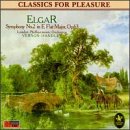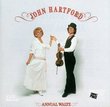| All Artists: Elgar, Handley, London Philharmonic Title: Symphony 2 Members Wishing: 0 Total Copies: 0 Label: Classics for Pleasur Release Date: 8/19/1993 Genre: Classical Style: Symphonies Number of Discs: 1 SwapaCD Credits: 1 UPC: 723721588823 |
Search - Elgar, Handley, London Philharmonic :: Symphony 2
 | Elgar, Handley, London Philharmonic Symphony 2 Genre: Classical
|
Larger Image |
CD DetailsSimilar CDs
|
CD ReviewsElgar's Second: heroic, introspective and magnificent D. MCGOVERN | New Zealand | 03/07/2002 (5 out of 5 stars) "...Elgar's Second Symphony is a masterpiece, and an underrated one at that. In common with all Elgar's great achievements, the symphony is an intensely personal work, and while there will be first-time listeners who simply can't relate to it, repeated listenings will reveal its riches. For me, Elgar's First Symphony was initially the more accessible of the two, but ironically the Second is the one that I now come back to again and again. The First may have one of the greatest adagios ever composed, but the Second has an unsurpassed sense of unity. Under the guidance of that supreme Elgarian, Vernon Handley, this recording is a glorious representation of the composer's musical vision. I have several recordings of the Symphony, but none come as close to achieving that seemingly contradictory mix of grandeur, nobility and introspection which Handley reveals in Elgar's masterly score. THIS is the journey of the soul, as Elgar himself envisioned.What a shock the symphony must have been to the audience at its premiere! The "stuffed pigs", as Elgar described them to his friend Billy Reed, would surely not have known what to make of the third movement Rondo, perhaps the composer's most startlingly modern inspiration. As performed here, it will come as a revelation to those who usually dismiss Elgar as the Edwardian clubman of music. It is a tremendously vital piece of music, and the perfect movement to follow the haunting but majestic Larghetto. I was also impressed by Handley's decision to include an organ for sixteen bars near the conclusion of the final movement. (Elgar had recommended the use of this instrument "if available".) The effect is as moving as it is unexpected, and another example of Handley's fine musical conscience.This is a marvellous work from one of the greatest of all composers. Let's hope EMI retains this interpretation in its catalogue for many years to come." The One to Own Christopher Wist | Sterling, VA | 12/04/2007 (5 out of 5 stars) "I first head this performance as a "Classics for Pleasure" LP way back in 1980. It was a revelation. Unlike the somewhat diffuse (not to say woolly) "back of the hall" sound long favored by EMI for Elgar performances by Boult, Barbirolli & Co., this recording features a rather closer perspective that allows you to hear many inner parts that are too often obscured. (Hmm. Maybe EMI only gives conductors that sound after they've been knighted. A SHOCKING oversight in the case of Vernon Handley, who has done more for British music than any other conductor I know of. Come on, Your Majesty - the New Year's Honours List is just around the corner. Let's get with the program, Liz!) Anyway, as for the music itself, when I first heard the extraordinary slow passage in the first movement featuring high celli, etc., I recall thinking to myself that it was beautiful, yet somehow evil at the same time. Imagine my shock when, years later, I read Elgar's own description of that section as "... a sort of malign influence wandering thro' the summer night in the garden..." I'm sure Sir Edward would be pleased to know that he achieved his objective perfectly - and without the help of program notes - at least as far as this Yankee music lover was concerned. But back to the performance... I concur absolutely with the reviewer who praised Handley's use of the organ in the finale, which Elgar had indicated could be used "..when available." The phrase that I recall from the Penguin Guide was that the organ was "...employed to tummy-wobbling effect," which is as perfect as a description of that moment as you're likely to get. But don't get me wrong - the principal merits of this performance don't lie in its fine engineering and the rare use of that organ pedal. From Handley's uncanny ability to find the tempo giusto, to his superb balancing of the choirs of the orchestra, this is a sovereign interpretation in all respects that will make you re-think everything you thought you knew about this piece. (This, notwithstanding the classic Boult and Barbirolli performances noted above, not to mention more recent excellent efforts by Sir Andrew Davis, Sir Edward Downes, Richard Hickox, Sir Colin Davis, etc.) For me, Elgar's 2nd under Handley's wise direction has it all - passion, grief, borderline insanity (!), and, in those magical closing bars, a longing for an indefinable something that just eludes our grasp, but whose loss in nonetheless borne with dignity and nobility. A magnificent performance of a magnificent symphony." A Truly Classic Recording of a Great Symphony Richard Ryberg Adams | Heidelberg, Germany | 01/23/2002 (5 out of 5 stars) "Elgar's Second Symphony is a very personal work for me - and I suspect for many others who worship this composer. It is an opulently scored and intensely emotional work that challenges as profoundly as do the best symphonies of Mahler and Bruckner. Many conductors have confessed a great love for this work but it still remains underplayed. Audiences who take Mahler's and Shostakovich's confessional rantings in stride seem less able to accept the same from Elgar. Maybe the knowledge that he is a British composer has hampered his acceptance worldwide although I can't understand why this would be so. I regret having more opportunities of hearing Elgar (or Vaughan Williams, Delius or Bax) in the concert hall but I am grateful that so many recordings of this particular work exist. I came to this symphony through Boult and Barbirolli's recordings. Boult's 1940s BBC recording and Barbirolli's 1964 Halle recording remain my favorite interpretations overall and they are world's apart in concept. Boult is powerfully driven whereas Barbirolli is more expressive in his usual heartfelt manner. Both are passionate and both make the strongest case possible for this symphony. What is so extraordinary about this Vernon Handley recording from the early 1980s is how he incorporates the very best qualities of both Boult and Barbirolli into one blazing performance. Handley studied with Boult and his technique is modeled after that of his great teacher but he's a much more impetuous and personal conductor - sometimes approaching the expressivity of Barbirolli without ever becoming indulgent. I have no doubt that Handley is the greatest interpreter of British music after Boult and Barbirolli and this recording is one of his greatest. No succeeding recording of the Elgar Second has matched it and I recommend it to all who wish to learn this great symphony. The sound is a little dry but it is clean and does much to clarify Elgar's thick textures. A truly classic recording."
|

 Track Listings (4) - Disc #1
Track Listings (4) - Disc #1

